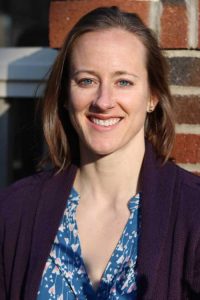By Brooke Helton
Duke Graduate School Communications Intern

After working together for weeks, English Ph.D. candidate Meghan O’Neil and her Story+ team of undergraduate students delivered a digital research guide and a set of digital exhibits to their client. The most valuable part of the experience for O’Neil, however, was the community she developed.
“It’s all about creating dynamic, learning communities and about figuring out how to combine your own personal research in some kind of larger structure or in a way that can make research a public resource,” O’Neil said of her experience in Story+, a new six-week summer research experience for graduate and undergraduate students interested in bringing academic research to life through dynamic storytelling.
Story+ launched this summer with funding from the Franklin Humanities Institute and Bass Connections, and in partnership with Versatile Humanists at Duke. Five project teams, each consisting of at least one graduate mentor and two to three undergraduate students, conducted qualitative, humanities-based research for sponsoring faculty or organizations, culminating in a final project in the form of writing, websites, exhibits, short films/videos, or other genres.
“Story+ gives doctoral students the opportunity to shape a complex undertaking in applied humanities,” said Edward Balleisen, vice provost for interdisciplinary studies, whose office oversees the program. “They serve as mentors to undergraduate team members, helping them define roles, develop research strategies, work collaboratively, set goals and timelines, and revise their writing and other analytical work outputs.”
Undergraduate students were expected to participate in the program full time while graduate students committed to 12 to 15 hours a week. Graduate and undergraduate students received stipends for their participation—$2,500 and $3,000, respectively.
In addition to meeting with their individual groups throughout the week, the project teams attended two events each week: Friday check-in sessions and a breakfast speaker series featuring experts in some aspect of narrative or digital humanities.

O’Neil, the graduate mentor for the Race and Ethnicity in Advertising project, said involvement with programs like Story+ and Bass Connections (in which she has also participated) can be key to building the networks that graduate students need. O’Neil said she realized over the course of her time in graduate school that connections are indispensable both professionally and personally, and that graduate students should get involved early in opportunities like Story+.
“I think the thing that a lot of graduate students don’t realize and that I didn’t realize coming in, is that you have to be very intentional about creating communities in graduate school …” she said. “In my experience and in many others, I think, graduate school can be very isolating.”
O’Neil’s Story+ experience allowed her to expand her own community while helping undergraduates connect with her network. She said the latter was essential not only to assist the undergraduates in their project, “but also to have as a resource for their entire undergraduate time. Helping undergrads recognize that those people are there and they are really excited about helping and developing relationships with undergraduates and their projects, that is the really exciting part of it for me.”
Before she could connect her teammates to her network, however, O’Neil had to first build the connections within the team.
“In the beginning it was ‘How do we work together as a team? What are our skills? How do we collaborate?’ ” she said.
O’Neil was not the only mentor who wrestled with creating a cohesive working environment. Adela Deanova, a Ph.D. candidate in philosophy, faced similar challenges as the graduate mentor for the RTI International 60th Anniversary Commemoration project.
“How do I take two undergraduates … who have different research skills, backgrounds and personalities?” Deanova said. “How do I take two people I’ve never worked with and how do I figure out a management leadership style that works for both of them and make the team gel and deliver something in six weeks with that?”

While Deanova had worked on similar projects, she said Story+ gave her experience in developing the skills of the undergraduate students. Deanova said her role was split into three parts: mentorship, project management, and client communication. Though the project was the main focus of the six weeks, Deanova took time to teach the undergraduates valuable career skills such as sending formal emails and producing professional materials.
“I’m basically teaching them how to liaise with clients and how to use more nuanced thinking like, ‘Ok, what is it that the client needs? How can I think about their needs and deliver them before they start asking me for things?’ ” she said.
“For me that was a really fun challenge, I had to think back to … on my first job, how did my boss train me then? It was an incredibly valuable management and leadership learning experience for me.”
O’Neil and Deanova said their Story+ experience will benefit them in their future careers. O’Neil hopes to pursue a career off the tenure track, either working in a humanities institute or a provost office, or helping with education programming or curriculum development. She said her Story+ involvement gave her practical know-how.
“In working for one of these institutes, you have to identify people who will work well together and whose research speaks to each other across disciplinary lines,” she said “So I think for me I have gotten a lot out of meeting new people in different departments and thinking about different research methods.”
For Deanova, Story+ sparked a new career interest in not-for-profit research organizations. She also gained experience mentoring undergraduate students, added a tangible experience to her résumé, developed references, and expanded her professional network.
“I think anybody who is doing any kind of humanities degree … if there is any doubt about your ability to get a tenure-track job, I think you need to diversify your résumé, and this is an awesome way to do it,” she said.
